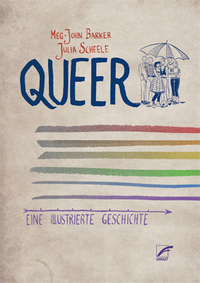Take a photo of a barcode or cover
1.06k reviews for:
Queer: Eine illustrierte Geschichte
Jennifer Sophia Theodor, Meg-John Barker, Julia Scheele
1.06k reviews for:
Queer: Eine illustrierte Geschichte
Jennifer Sophia Theodor, Meg-John Barker, Julia Scheele
3.5 stars
As someone who is fairly new to this topic, I really enjoyed this book.
First of all it isn’t a graphic novel and just a highly illustrated text. The title is also a bit deceiving as it actually focusses a lot more on queer theory than history.
That being said, they explain academic queer theory in understandable bite size paragraphs.
I gained a vast amount of information and to me it feels like a beginners introduction for this particular topic.
Again, as I am not as familiar with queer theory and inexperienced with these academics texts I can’t point out flaws within the explanations itself. For a more in depth analysis of these texts and essays they suggest that you should research on your own. They include an extensive resources page at the end of the book to do so.
The only thing that bothered me were the lack of POC (illustrations) when they gave examples for certain theories in mainstream media.
All in all an interesting read for a newbie like me.
As someone who is fairly new to this topic, I really enjoyed this book.
First of all it isn’t a graphic novel and just a highly illustrated text. The title is also a bit deceiving as it actually focusses a lot more on queer theory than history.
That being said, they explain academic queer theory in understandable bite size paragraphs.
I gained a vast amount of information and to me it feels like a beginners introduction for this particular topic.
Again, as I am not as familiar with queer theory and inexperienced with these academics texts I can’t point out flaws within the explanations itself. For a more in depth analysis of these texts and essays they suggest that you should research on your own. They include an extensive resources page at the end of the book to do so.
The only thing that bothered me were the lack of POC (illustrations) when they gave examples for certain theories in mainstream media.
All in all an interesting read for a newbie like me.
informative
slow-paced
an interesting read! this definitely made me even more more excited to read some of the queer theory works i already had on my tbr (gender trouble, the queer art of failure, etc). i think this serves as a valuable reading list.
something that bothered me more and more as the book went on was that it never attempted to define "identity politics". this became rather problematic as the book makes a variety of claims about identity politics without explaining what exactly that phrase means. for example, on page 42, barker writes on the topic of black feminists:
something that bothered me more and more as the book went on was that it never attempted to define "identity politics". this became rather problematic as the book makes a variety of claims about identity politics without explaining what exactly that phrase means. for example, on page 42, barker writes on the topic of black feminists:
"In the 1960s and 70s, black feminist thinkers criticized both the civil rights movement (for neglecting gender) and the feminist movement (for neglecting race). They pointed out that different groups of women had very different experiences and agendas—that being a woman is not the defining feature of identity for those who also suffer other oppressions. For example, white middle class feminist agendas are often alien—or even counter to—those of black and/or working-class women. This undermined the assumption that there was any form of fixed, universal identity, as well as challenging any kind of identity politics basis for activism. Instead, they focused on political and economic analyses of structures of domination. In this way, black feminist thought could be regarded as the root of both queer theory and queer activism.
this is all well and good—EXCEPT FOR THE FACT THAT A GROUP OF BLACK LESBIAN FEMINIST THINKERS IN THE 1970S INVENTED THE TERM "IDENTITY POLITICS" TO REFER TO THEIR OWN POLITICAL IDEOLOGY. in their 1977 statement, the combahee river collective wrote:
Above all else, Our politics initially sprang from the shared belief that Black women are inherently valuable, that our liberation is a necessity not as an adjunct to somebody else’s may because of our need as human persons for autonomy. This may seem so obvious as to sound simplistic, but it is apparent that no other ostensibly progressive movement has ever considered our specific oppression as a priority or worked seriously for the ending of that oppression... This focusing upon our own oppression is embodied in the concept of identity politics. We believe that the most profound and potentially most radical politics come directly out of our own identity, as opposed to working to end somebody else’s oppression. In the case of Black women this is a particularly repugnant, dangerous, threatening, and therefore revolutionary concept because it is obvious from looking at all the political movements that have preceded us that anyone is more worthy of liberation than ourselves. We reject pedestals, queenhood, and walking ten paces behind. To be recognized as human, levelly human, is enough.
i think that barker was trying to make a point about how black feminist thinkers protested the exclusionary nature of the mainstream activist movements for women's rights, black liberation, and acceptance of homosexuality, which tended to be centralized around a singular identity and thus left those who occupied multiple marginalized identities to fight for themselves. however, saying that black feminists were "challenging any kind of identity politics basis for activism" is at best confusing and at worst, not only historically inaccurate but potentially putting black women on a pedestal and handing them the responsibility of alleviating other groups' oppression.
i'm not going to go into the six or so other times in queer: a graphic history that the term "identity politics" pops up—usually saying that someone or something was opposed to identity politics—but they all left me with the same question that this example did: what does barker mean by "identity politics"? there are definitions for similarly common terms like "homophobia" and "heteronormativity" so i don't think a definition would have felt out of place; in constrast, it would have enhanced the book for me by far.
informative
reflective
slow-paced
To start, I should say that I find the title misleading because the book is about Queer theory and not Queer people. There's a huge difference between the two and the book does little to point this out. Unfortunately, that's only the tip of the iceberg when it comes to this book. Each section is about half a page and offers the most boiled down definition of a topic. In some cases, this leads to a misinterpretation of the subject material. One of the most glaring examples is talking about Adrienne Rich's "On Compulsory Heterosexuality and Lesbian Existence." This book states that the theory is about how people are subject to being fed messages about being heterosexual and the essay is short-sighted for not considering gay men or other minorities. The essay focuses on Lesbian existence because it centers around how women are heavily socialized to find a man and the societal pressure and fear of social isolation can lead women who aren't straight to repress their own desires in order to accepted. It talks about the specific issues women face, namely that society tells women their identity only matters in terms of how it's connected to the men in their life, and how this pressure is incredibly hard to root of your brain. It's touching on an issue that affects a specific group of people. A "confirmed bachelor" never endured the same ostracization that "spinsters" did. The book also talks about the concept of "queering" and misrepresents it so that the identity of queer can be used to describe anyone in the kink community. This is even more perplexing since the entire book focuses on how labels are holding the LGBT movement back more than almost anything. There's also a strange section about monosexual privilege that is incredibly short-sighted considering the constant oppression that homosexuals face versus heterosexuals. You can talk about the specific issues with being bisexual without deciding that homosexuals somehow face less oppression. Any person who identifies as LGBT+ faces systemic oppression. The discussions of trans people, nonbinary people, and the aro/ace spectrum are incredibly limiting. While this book might work well as an introduction to these issues for people not inside the community, the misrepresentation of community issues is a large concern.
I’m glad to have read this if only to help shore up some gaps in my own knowledge base (I am thinking of a conversation with my partner about identity politics that made my brain hurt A LOT, but now I’m seeing more clearly). This is a great book for those of us who have no real interest in becoming a queer studies scholar but do want to have a better understanding of queerness and queer theory. Structurally this book is basically a textbook-style introduction with comic-style illustrations. In being that it meant to be introductory Barker and Scheele use quick, clear sentences and art to clarify terminology and chronology. This is a bit of a mile wide and inch deep approach. While the goal of the book is to help make the theories applicable and understandable – one that it achieves – it unfortunately was a bit of a slog.
full review: https://faintingviolet.wordpress.com/2021/07/08/queer-a-graphic-history/
full review: https://faintingviolet.wordpress.com/2021/07/08/queer-a-graphic-history/
challenging
informative
slow-paced
I think that it handles a basic intro to queer theory and the lack of consciences that comes with it about as well as a book can. The illustrations are pretty cool though def have that academic comic look to them. I think that it can get a little bogged down and slow simply because of the complexity it has to try and simplify but not a bad read overall
informative
medium-paced
Queer: a Graphic History is a great intro to queer theory and what queer theory does well and what it should approve upon. It was interesting and the illustrations are intriguing and thoughtful, but I found myself rereading sentences to make sure I actually understood what was being said. Otherwise, it is a good introduction and provides many people and ideas if the reader wants to learn more.
challenging
informative
reflective
slow-paced







